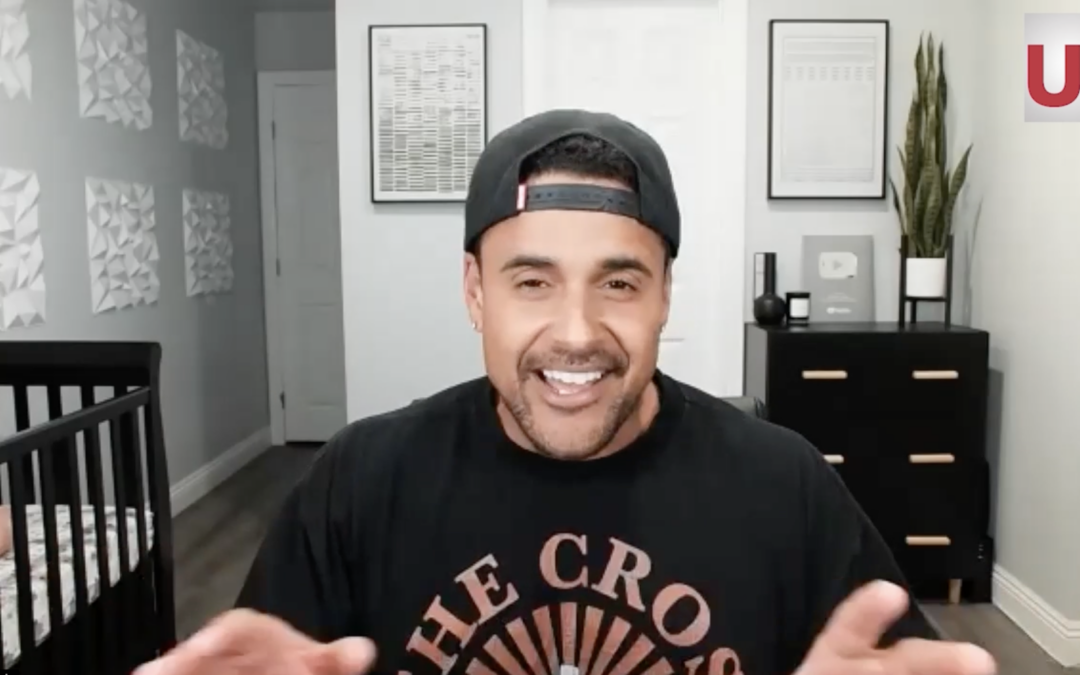
by Allen Reynolds, UrbanFaith Editor | May 20, 2024 | Commentary, Headline News, Magazine, Prayers & Devotionals |
Have you ever wanted to pray, but it felt like a chore? Have you ever been seeking God for direction but felt like you didn’t know if you could hear Him? Have you ever wanted to pray but simply didn’t know what to say? Pastor Andrew Carter has written the book for all of us on how refocus our prayer lives. The Privilege of Prayer: Find Healing, Transformation, and Answers, is Pastor Andrew’s guide on how to help us connect with God in ways many never thought possible. The full interview is above. Excerpts and more about Pastor Andrew are below.
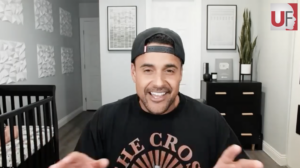
UF: We are excited today to have another amazing author, minister, pastor, leader, pastor Andrew Carter, who is sharing with us and we’re talking about his book, The Privilege of Prayer: Find healing, Transformation, and Answers. Can you talk about why it’s important that you frame prayer not as a formula or a way to make something happen, but really focused in on prayer as a relationship with God?
Pastor Andrew: Yeah, absolutely. I believe that all of our relationships really trickle down from our relationship with God. And I talk about just that. If you struggle to communicate with God who loves you, right, even with all of your flaws and mistakes and blunders, if you struggle to talk to the greatest lover of your soul, what does that look like when you communicate to somebody who’s not going to love you like that, your spouse or a friend? If you struggle to spend time with God, like how hard is it going to be to spend time with other people in a way that is devoted and is intimate like you would with God?
UF:
You developed a discipline of prayer in jail amid a community and I think that’s so key that we have to be surrounded by people to help disciple us and raise us up in the faith. Can you talk a little bit about why that’s important and kind of your journey to being discipled in prayer?
Pastor Andrew:
Yeah, yeah, as far as the discipline aspect goes, I grew up unruly with a lot of instability, both of my parents were drug addicts and so what I found is that in chaos, I typically match my environment. I’m chaotic as well, but when there is a sense of consistency and discipline and stability, I thrive. And so, I understood early on when you discipline yourself consistently it always equals results and I found that out in the physical fitness realm before the spiritual realm. And so really, I just adapted what worked in the physical, applied it to the spiritual and watched my prayer life just take off.
UF: Can you talk about why it’s important to see prayer as an opportunity and an honor and a privilege instead of as an obligation?
Pastor Andrew:
I mean, if you ever try to put together any kind of a toy the day after Christmas or try to put together a cabinet from Ikea, any of those things, they all come with an instruction manual. And, you know, I know that men tend to be adventurous, and we think that we can put things together without the guide. But nine times out of ten, you’ve got extra pieces laying around. You don’t know where things are supposed to go. It’s probably not sturdy. It doesn’t look the way that the manufacturer had made it out to be. It’s important that we’re praying because that is a part of the design that God made for us, this communion, for this intimacy, for this communication. So, rather than looking at it like you said an obligation, like we have the privilege to go directly to the source of the instruction, not just the instruction manual, the writer of the manual one on one to get all the direction guidance, vision, happiness, peace, enjoy that we could ever imagine. It’s really a privilege.
UF:
Can you talk a little bit about how we can overcome some barriers that keep us from connecting and communicating with God in prayer?
Pastor Andrew:
Absolutely. I would say that most of the barriers that people experience come from a lack of knowledge or understanding of the enemy uses lies to try to prevent you or stall you from entering that relationship. They’ll say “did he really say that” or you can’t hear his voice or he’s not listening and we allow these barriers to come between us and God and so one of the things that I preach all day and I’m not trying to be too preachy but like, you can’t say that God’s not talking to you if your Bible is closed, right? You can’t say that he’s not talking to you when he speaks primarily through the Word. And so many people are trying to hear God’s voice but they’re so attuned to what the world says and they got the world turned all the way up they got His voice turned all the way down. Many times, they’re not barriers at all, they’re what we perceive as barriers, but it’s many times just us not understanding who we are, based on what the scripture tells us.
UF:
Second to last question I have you a lot of the folks who are listening and hearing and engaging with us they’re young adults, and they’re trying to figure out how do I ground myself?
Pastor Andrew:
Yeah, I love that question because I work with young adults, myself here in Los Angeles and one of the things that I see about young adults right now are probably some of the most spiritual and connected individuals that I’ve met. I’m surrounded by [people in their 20s], and they are so spiritual they’re so in alignment with the voice of God, like there is an anointing on this net I get goosebumps talking about it there’s there there’s an anointing on this next generation. One of the things that they lack is consistency and discipline. They’re up until two three in the morning, doing God things right. They’re at prayer meetings and they’re doing all of these amazing things for the Lord, but they can’t even keep a regular job because they’re just following the Spirit wherever the Spirit goes and I think that a lot of them are missing that solid practical discipline and consistency because it’s not one or the other it’s both and right you need to have that that kind of spiritual, you know, alignment with the Lord but it also needs to be in a way that is discipline and consistent and has order so if I were to say one thing I would say, get yourself around a man or woman of God, who has gone before you who exemplifies the discipline and consistency. Mentorship is probably one of the most important things that I’ve done. I have leaders and mentors and accountability partners and overseers in my life who I check in with every week, to check my blind spots, and it has helped me grounded. So, in the same way young adults, don’t be afraid reach out and get yourself some good solid mentors and individuals who will disciple you.
UF:
What is the piece of advice that you would give to folks who are trying to deepen their prayer lives so what what’s the number one thing you would tell them as they go to get your book for more.
Pastor Andrew:
To be to just show up. I think that that’s one of the hardest things to do I was in the fitness industry for a long time I owned a gym, and one of the hardest things that people struggle with is just showing up like once they get there. You know, they’re able to go through the motions but getting there is many times the battle, so the same with prayer sometimes. The words come, Holy Spirit will intercede, we know Jesus intercedes on our behalf. God will speak to us, but many times it’s just getting there. So, I would encourage people to carve out some time, set an alarm, turn everything off and just show up, and you’ll be surprised what God does in those spaces that we create and allow. He’s not always looking for ability. He’s looking for availability, and I’m a testament to that, because I am probably the least qualified to write a book, I’m probably the least deserving. There are guys who are way smarter, better communicators, more articulate, have spent more time in the Word. But the one thing that I’ve done is I made myself available and because of that availability, He’s overlooked my ability and he’s made sure that I’ve been fully prepared and equipped for every situation not by my strength, but by His. It starts with showing up
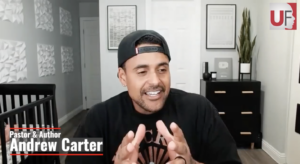
Andrew is the founder and lead pastor of Royal City Church in Los Angeles, California. He runs a popular live YouTube Bible study called ‘Coffee and Prayer’ that streams on all major podcast platforms. He appears on television networks, podcasts and stages preaching the good news of Jesus. Andrew travels the world guest speaking at conferences, churches, and events.
Andrew has become an inspiration for others who face difficult times and struggles. With millions of followers, Andrew has become an influencer for God’s Kingdom. He is a leader, speaker, writer, husband and father. Andrew and his wife, Kyra, live in Los Angeles, California. You can find Andrew on all social media platforms @andrewfcarter
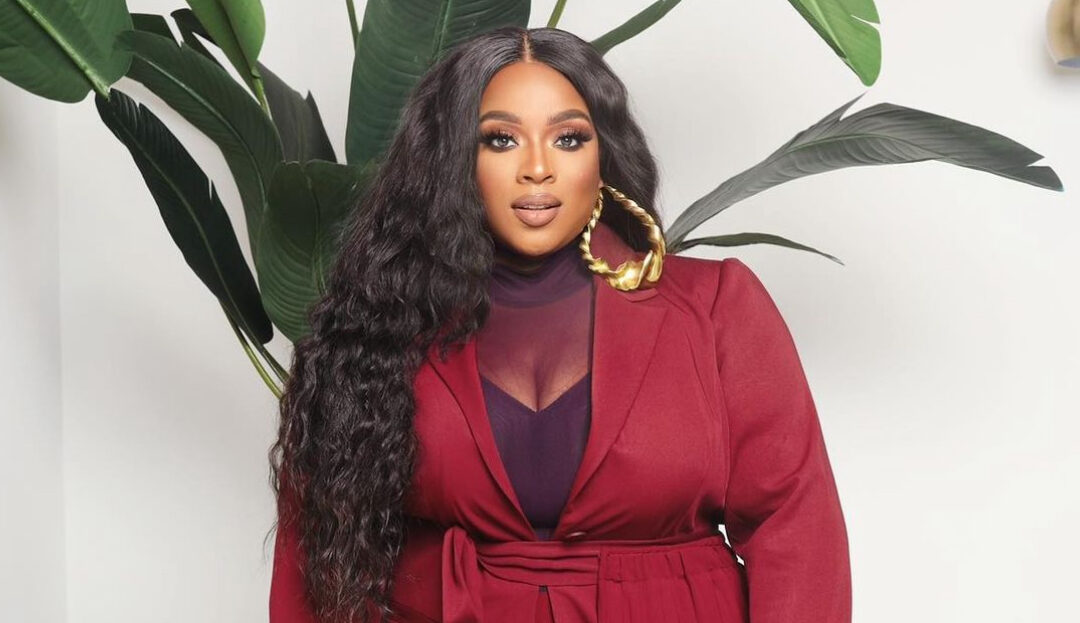
by Maina Mwaura, Urban Faith Contributing Writer | May 15, 2024 | Commentary, Entertainment, Headline News, Magazine |
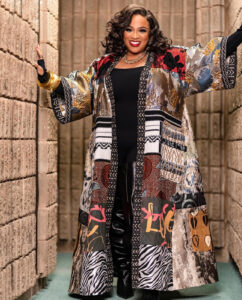
Maina:
Kierra, you are also one to speak into young women at the same time too. Does that come from the family?
Kierra
I think it does. And just from what I’ve seen, my father and my mother, they are spiritual leaders, spiritual advisors. And my mother, like it’s funny you’re asking that because I just got off the phone with her and we’re planning our women’s weekend. For my mother, I think it comes from her sisterhood. We’ve seen the Clark sisters do their thing musically. But I think her bond and her desire for, you know how you are about your siblings, I want my sister to win. She has one brother as well, but he’s much older. So having that connection and always wanting to see your sister win and seeing what you and your sisters can do together and how you can empower other women and then me seeing what my mom and my aunts have done. And then here I am. I’m like, I have a brother, but I can make a community of sisters and I’m important to them. So I absolutely think I draw that from, I can call my family, my bank, I draw that from that bank as well. I think just from my personal experiences with relationships and having best friends. I’m sure you’ve probably heard it where women will say, “Oh honey, I can’t get along with women.” And then “all I can get along with is men.” And then it’s like, well, if you find the right woman that you connect with, you really can get some answers. And we even see it biblically, where we see women drawing from the well, we see both Mary’s coming together from different aspects of life. And then we saw what they did with Jesus. We see Esther, we see Ruth and Naomi, so when you read that and you believe God’s Word and also you experience a liberating relationship from a sisterhood that may not be biological, but it could just be covenantal. If you know what I mean? You just want to give [it to] the world that so that they can see it, because the world has kind of demonized relationships and they’ve put so many labels that are associated with toxicity. And it’s like, if only you’d get in touch with the God ordained relationship, you’d see how powerful it is. I think I’m pulling from the familial bank, but I’m also pulling from my spiritual bank to create these things that are women’s empowerment.
Maina:
And your newest book, Kiki Finds Her Voice, how did you find your voice?
Kierra:
I found my voice again from my family. So I’m going through school and I’m talking about it in the book. I wanted to sing an R&B song and I was trying to fit in with the girls there. And I knew if my mom or my dad found out that I was trying to sing, you know, an R&B song about getting weak in the knees or the boy being mine, I knew they would have just, you know, shut it down. And my mother surprised me and she said, girl, you ain’t singing that song. This is inappropriate. You know, and I talk about it in the book. And just going through that journey…it felt like I was being embarrassed. For adults, it feels like an attack when it’s actually accountability. And I think that is what my mother was doing, holding me accountable and redirecting me to purpose. And literally that day changed my life. It set me up for my debut. And I found my voice and became a voice for a generation and connecting so many listeners to the Gospel by way of singing. And that’s how I found my voice.
 Maina
Maina
Your last book, The Vibes You Feel, where were you at when God told you to write the book?
Kierra
Oh, man, that’s a good question. So the vibe you feel is actually just from everyday kinds of situations. I don’t even know how to explain it. That’s such a good question. Where was I at? I was everywhere. I was just living if I could just say that.
Maina
Why has it resonated so with girls and women?
Kierra
Yeah, I don’t know what the call is. I know it’s a call. It’s a heaven call. Because I know that I have a responsibility to the age group that are in their 20s. I don’t know what that is. But so what’s funny is that I went through a space where they annoyed me so much. I was just so annoyed with ages 20 to like 30. And I’m only 36. And I think it went, I think the frustration came from me wanting to pour into young women as I’ve been poured into. And I saw how helpful it was for me. And I remember myself in my 20s, where I was on the brink of knowing it all, but also honestly saying in myself, you don’t know it all. But I found those advisors that I could connect to and relate to that I felt comfortable with being a student and didn’t feel like I had to do a match with them if that makes sense. It was that and then all of the wrong decisions that I made in my 20s. I made some bad decisions in relationships. And then being a PK (Pastor’s Kid), they say they’re like the worst kids. It’s like you got some PKs who are that kind. But you have some who are like, “well, actually, I really do want to live like Jesus.” But I do have a side to me that I think everybody else may have as well. So that’s where I was in that place, though. It’s a conglomeration of those experiences of me, you know, just kind of walking through life and then seeing the essence in valuable and God ordained relationships versus relationships that I was trying to make work. And I often ignored God’s voice, but also would say, I don’t hear God. And it’s like, no, you hear him, you just don’t hear him the way that you think you’re supposed to hear him. And so that’s what you get from the book. It’s literally me evolving in my relationship. And over the course of time, just collecting data like; “my gift of discernment is actually far more on than I thought.” And it was like that in my 20s. But I just kept doubting myself. But that’s where I was. And that’s why it’s a book. But even with me then growing to love the generation that I’m responsible for that are in their 20s; it’s like, this is why I connect with you so much because I know it. I get it. I’ve been there. And I know how it feels to feel like you have so much to do, but you don’t know which steps to take and you’re brilliant.
Maina
When you hit send on The Vibes You Feel, did you feel like you said it all? Did you feel like, okay, this is ready?
Kierra
Yes, I did feel like it was ready. The only challenge that I honestly faced was trying to make sure it didn’t sound so much like another memoir. Because I still wanted to give God and his scriptures. So yes, though, because it is so many good moments in there that really happened. Even with my working relationship with me trying to find like a personal assistant, it was like, this person is good, but they’re not called to be your personal assistant. They’re not bad. And it was things that I could pinpoint. If you know what I mean. And I just kept misplacing people. It was like, you’re called to be in their life before a season and not for this space. And I couldn’t play victim because I knew. So, the book is basically me, talking about my work choices. It’s me talking about my relational choices when I was dating. It was like, you knew this guy was no good, but you kept trying to make it work. People prophesied to you, and you even saw bad habits. So those stories were true, and it actually happened. And that’s when I saw God talking to me. So that right there was when I was like, “yeah, this one is the one.” And I really hope more people get a chance to read that book because I really think it is a blessing for a lot of young people, for sure.
 Maina
Maina
So Jordan [your husband], can we talk about him for just a minute? What is it like? You guys are definitely in love. So how do you find a Jordan?
Kierra
That’s a good question. I remember a lot of people saying marriage takes work. And I heard them. I’m a good listener. Like I listen and I take the note. But when I got in it, I said, oh, baby, this take work. I don’t know if you can put that in writing. It takes work. And you know, I think it also takes even a village for the married couple. I always say the village is not just for the child, it’s for the adult too. And you got to have people around you two who can even see sometimes what’s going on. They can even see your bad days, but they don’t charge it to your marriage and what your entity is called to do in the earth. And that contributes to the days when you must choose to love, if I can say it that way. But Jordan is amazing. He’s an outstanding man. And I think what makes what makes marriage possible with this man of valor is his heart. His heart is always what push through. So if I were to tell [a young woman] what to look for, it is to do what my mama told me, make sure that man loves God more than he loves you. Because when you can’t get them, God’s gonna get them. And literally, when I couldn’t get certain memos to my husband, I just say, “you know what, you get it God.” I go in my room right here in my office, and I would cry and say, God, I need you to do it. And I’m sure [my husband’s] done the same for me. And then I think to just making sure you have a friendship. So, I also tell young women, I’ve done it both ways and not with my husband, but I’ve done it both ways as in I was out of the will of the Lord. And then I did it God’s way. And I saw why he says don’t have sex before marriage, because it’ll blur the lines and you can’t see what you need to see to make a good choice for marriage. You’ll just make a choice off of an attachment and how you feel. Jordan and I, we went through a process of abstinence, and we lived before the Lord, we prayed, and that made all the difference. So that’s what I would tell a young girl, make sure you get his background too, you know, and pray and ask the Lord, give me somebody that loves [God] because I need them to be convicted if ever they decide to do something that ain’t right. And so that’s how Jordan and I are doing. We’re doing really well though, we’re loving each other, we’re growing together, and we’re willing to just love each other and have fun. The other day we were arguing, we just started laughing like, this is stupid. So, we’re even growing to laugh and argue.

by Maina Mwaura, Urban Faith Contributing Writer | May 6, 2024 | Commentary, Headline News, Relationships |
UrbanFaith talked with acclaimed actor Courtney B. Vance and famed psychologist Dr. Robin L. Smith (popularly known as “Dr. Robin”) about their book: The Invisible Ache, a moving combination of memoir, psychology, and practical tools that offers Black men guidance and support for reclaiming mental well-being and finding whole, full-hearted living. This interview has been edited for length and clarity.
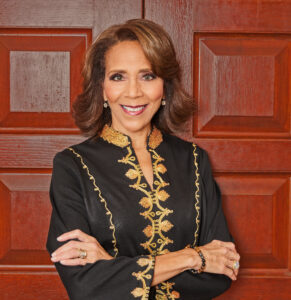
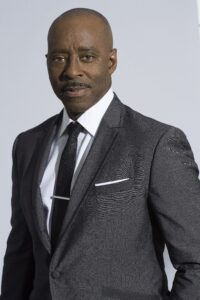

Maina
Well, Mr. Vance, I gotta tell you, this book starts off like captivating from the introduction page. And it’s one of those things where I was glued in from the start. So Mr. Vance, you’re going through your own background here as well in this amazing book. What did it do for you?
Courtney B. Vance
You know, it’s always the whole idea of telling one’s truth. I can imagine most people, they keep their truths to themselves. There’s no vehicle…for being able to share or just get it off of yourself. And I was blessed to be able to have one. After the tragedy happened 33 years ago with my father, my mother asked my sister and I to go back to our respective cities to find a therapist there. And, just the journey of that… the journey of trying to honor my mom and what she asked us to do. Which I came to find out was saving my life. I had no idea. But it allowed me to be able to begin my journey and get myself whole. To get myself ready for the next phase of my journey, which was Angela. Getting myself ready for that phase of my journey required something else of me, more of me. But if I hadn’t done the work that my mom asked me to do, I wouldn’t have the courage to go the next phase to get myself ready for Angela and then to get myself ready for our twins and get myself ready for what God’s got for me after the twins [went to] college and Angela and I had our life without our children. It’s really all about “be strong and be of good courage,” because life is not going to be smooth. You have to prepare yourself for those battles.
And it doesn’t mean just because there’s a battle, there’s something wrong. It’s just part of life. And you have to understand that wisdom is the principle thing, get wisdom. If you don’t know that trials are part of life, when you come up on a trial, you bail. [But] it’s just the beginning. God’s just trying to get us ready for what he needs us to do. Don’t think that you’re the only one. [God said to Elijah there’s] 3000 other people, God’s got ready. So, I’m just grateful that my mom asked my sister and I to get ready for the next phase of our lives through this therapy and sharing our stories with someone, our truth with someone. And because sharing the truth seems like it’s so much work and so hard, you don’t know that it’s gonna be okay. But that’s just a part of it. As Dr. Roberts says, it’s your God given right to share your truth and your story and to come into fullness.
Dr. Robin Smith
Courtney and I talk a lot on the road and in the book The Invisible Ache that we all have holes, H-O-L-E-S. And so often we’re ashamed of our holes. The parts of us that are broken, and that ache and that hurt, are part of our divine birthright to be human.And we all have holes, longing to be whole, W-H-O-L-E, which is a holy, H-O-L-Y, journey. So if we think about the way in which we were robbed of our whole humanity, the holes and our longing for wholeness and told that we were only three-fifths human, much of The Invisible Ache is about inviting and re-inviting black boys and men and all of those who love them to remind and encourage black boys and men to recognize that it is their right to have their holes, longing to be whole. It is to help black men not only identify their pain, but to claim and reclaim their power that they are indeed wholly human. They’ve got holes, longing to be whole, and that is a holy journey. And so, we know that black men and boys have been so marginalized, have been pushed to the margins that Courtney and I are calling all black boys and men to the floor of their own life, to the table that has been set for them to flourish, to grow, to grieve, to receive, to be fully and wholly human.

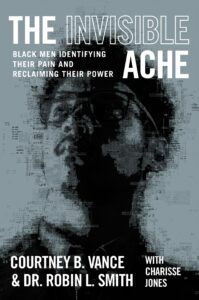
Maina
Well, you’ve definitely done that in the book. I just wanna once again thank you both. Dr. Smith, can I ask you this question? Why are we seeing these numbers the way that we’re seeing them? When it comes to suicide rate amongst black men. Where do you think this is coming from?
Dr. Robin Smith
Yeah, black men and the suicide rate for black children, not just adolescents, but black children have increased. Eight-year-olds are dying by suicide. And so, I think the question you’re asking is, what is it that is sitting on the souls of black boys and black men and black people? The surgeon general is considering making loneliness a health hazard. Not like it’s something that is upsetting, but because he knows, and the statistics and research are showing, that isolation and loneliness can be as toxic, if not more, than some of the chronic diseases like diabetes or cancer or smoking 15 cigarettes a day. Loneliness is more detrimental to our health than smoking 15 cigarettes a day. That doesn’t mean it’s good to smoke 15 cigarettes a day, but it says what isolation and loneliness does to black men and to black boys. And so, the reason that we are seeing such an increase in depression, anxiety, as well as attempts at suicide and unfortunately, suicides is because we don’t ask black men, does it hurt? We ask, where does it hurt? Courtney and I asked this in the book. And the increase in suicides, but also in mental torture, has so much to do with isolation, systemic racism, and the inability to understand why I hurt so badly.
Maina
Mr. Vance, if I can ask you a question here, when it comes to going to counseling in the black culture, especially with black men, there is kind of this stigma towards it. What would you say to a black man like myself [about why we] need to go to counseling? Like here’s why it’s a very healthy thing to do.
Courtney B. Vance
And I would say that you’re talking to someone who was in the achievement business up until I was 30. I mean, that’s how I was raised. I was raised to excel in sports, academics. We knew the classroom was where we were supposed to do our thing. And we did. And that cured a multitude of evils and sins. You know, I could retreat into my books and get pats on the head and on the shoulders and get great job, great grades, wonderful, wonderful . And meanwhile, you know, my father and mother were dealing with their invisible aches based on how they were raised and where they were coming out of The [Great] Depression, raised in the depression. And what their mothers and fathers were able to give them coming out of just the vestiges of slavery and their parents were slaves. But we’ve all been harmed by the vestiges of slavery, white, black, brown, beige and everybody in between. We’re all dealing with the trauma of that act. And mentally, emotionally, you know, we’re dealing with the trauma of the pandemic and what it did to those babies and young people that Dr. Robin mentioned. We’ll be dealing with the repercussions of that for generations because nobody wants to talk about it. We’re in the business of achieving but pretending. And the out that they find is to end the life as opposed to begin the journey of self-discovery. So, as Dr. Robin says, this is holy work. This is a ministry where we’re dealing with this book of just getting people to recognize everyone gets to the end of their rope, but get to the end of your rope, not the end of your hope. Get to the end of your rope and look up and ask for that help that is there for all of us. We all get to that place where we don’t know what to do. You’re sitting on your bed at the two in the morning and you don’t know what to do. Then the next step is what Dr. Robin says, then let’s begin. Here’s some information. Here’s some tools. Here’s some exercises. Let’s just begin. Don’t just give up. Don’t give up. Just begin.
Maina
Guys, the last question here is, I’m going to stay true to our time, I’m going to ask you both of these questions differently on the last one. Dr. Smith, I’ll start with you. You mentioned shame in the book, which I thought page 21 was the best part of the whole book. Can you talk about like what the problem is with shame and when it comes to the black man?
Dr. Robin Smith
Yes. And thank you for that question because I call shame and blame the toxic twins, but shame is a spirit killer. Shame murders the soul often. And we don’t know that. We don’t know when we are feeling not good enough. You know, I call it the not good enough wound, It’s like being followed 24/7, 365 days a year, the way black men feel often when they go into a department store. They just know that someone’s eyes are just on them, that they are being targeted, not just physically, but that there is an expectation that they will fail, that they will suffer, that I mean, that they will steal, that they will harm someone. W.E.B Du Bois said “how does it feel to be a problem?” Then he went on to say, “when you’re not the problem.” What does it feel like to have someone stalking you, Ahmad Aubrey, what does it feel like to have someone [watching you] when you’re jogging or living while black? And so there is something that happens around victimization. When women have been violated, when they have been sexually violated or physically violated, often they will not want to tell people as if somehow, they contributed to the assault. You know, people will even say, “well, what were you wearing? What did you have on?” So whether that’s to a woman or saying to a man, did you have a hoodie on? This is the whole thing about what did you do to make someone hate you? Instead of that black people have been targeted most often because of our excellence and our refusal to die. And so shame is something that it’s a warped misunderstanding about whose fault and whose responsibility your life and hardship is. And I just want to say this in closing, that does not mean we don’t have responsibility. It does not mean that we are not accountable. It does not mean that I can just let someone else do my work. But what it does mean is maybe I can have more courage and strength and resilience, as Courtney often reminds us to do the work if I understand where my responsibility begins and where it ends.
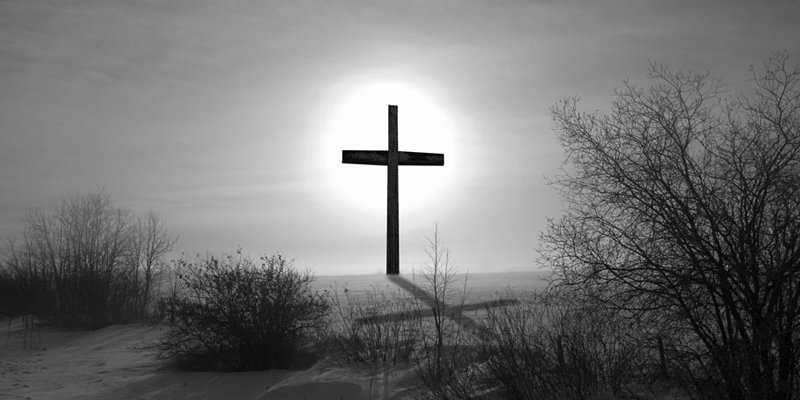
by Harold Dean Trulear, Ph.D. | Apr 16, 2024 | Commentary, Headline News |
Early Easter morning, millions awaken before sunrise with a purpose. The dark skies give faint hint of the sunrise within the hour. A stretch of the arms, a wipe through the eyes, feet reaching downward for temporary covering against the floor terrain, and it is time to get moving. Slivers of remaining moonlight provide faint illumination through narrow openings above the bed. The millions have heard the call, and now respond! The time has come to join the line as men and women, even some boys and girls put their feet in the line to the appointed destination to which they are called this Easter Sunday. There they will see familiar faces, hear familiar sounds, and may even smell familiar odors. It is a dawn of a new day, and they are on their way.
Their destination? “Chow call” in the prison refectory or “Meds up!” to the cart the nurse brings on the unit for those requiring morning medication. The stretch of the arms relieves some of the tension from the cell’s hard cot, the eyes crusted literally and figuratively by biology and monotony, the floor’s terrain cold on even the warmest day when one’s address is prison. We do not know how many millions go to church on Easter–but we know how many awaken in state and federal prisons: an excruciating 2.1 million men and women arise at Easter’s sunrise to another day when they seem oblivious to anyone on the other side of the prison walls. Another several million arise in county jails, many not physically far from home but incarnations of “out of sight, out of mind” even to those who are descendants of those to whom Jesus spoke just before his arrest and incarceration “I was in prison, and you visited me.”
Yes, millions have arisen with a purpose: count down the days, occupy the mind, anticipate a visit, and perhaps even attend chapel — purpose is a precious commodity for them. They are inmates, prisoners, convicts peopling America’s jails and prisons in record numbers — over two million in state and federal prison alone — and they arise every morning about the time the Easter Sunrise service crowd shakes the cobwebs from their consciousness to face their annual celebration.
The Easter lens well fits any view of incarceration. After all, when Jesus Christ died on the cross, he was an inmate. We celebrate the truth that God raised his only begotten son from the grave — we overlook the fact that the body which breathed its last before burial belonged to a prisoner. He hung between two thieve or malefactors, but “was numbered” with them as well.
Shame and Stigma of Incarceration
Incarceration in America carries more than the punishment of “doing time.” Shame and stigmatization plague an inmate during incarceration and after release. Those twin maladies spread like a virus to relatives left behind, children separated from fathers and mothers, parents grieving for their children, grandparents serving as caretakers for a generation forty, fifty, and sixty years their junior while fathers stretch their arm in the cell and mothers wipe their eyes on the block. Shame and stigma, contagious and infectious as they manifest in symptoms of silence, rendering the affected loved one incapable of sharing the true hurt with anyone at the Sunrise service in celebration of the Risen Inmate!
It is Easter sunrise…. God listens for the praise of God’s people from the cathedrals and storefronts, the megachurch and mass choirs, parish priests and local pastors, pulpit and pew. But God also listens for the prayers of the prisoner, wrestling with past demons, present conditions, and future uncertainty, all with some hope of the transformation promised by the Risen Inmate who makes all things new. Millions arose this Easter morning to attend a sunrise service. Millions more arose to attend to the business of doing time.
An important connection exists between these two populations — this dual set of early risers on Easter morning. Many of them count people in the other crowd as kin — many who run with one crowd used to sit with the other. Many who heard the sound of the choir’s “Hallelujah Chorus” or “Christ the Lord is Risen Today,” or “Praise is What I Do,” this morning once heard “Chow Up,” or the slow grind of motors turning to open a series of cell doors. The cymbal was the clanging of cages, the tambourine the rattling of chains. And some who this morning donned uniform orange, blue or tan jumpsuits once sported matching white or black robes on a morning such as this.
Preaching seldom reaches the pain felt by the incarcerated and their families. The separation traumatizes, the anger and disappointment of those left behind papered over by Sunday School memories of lessons on forgiveness. Many incarcerated parents long to see their children; some allow shame to hold their children at bay. Many who do seek the comfort of the Risen Inmate to dry their tears and encourage their hearts find disappointment in the prison chapel service when the local church sends well-meaning but poorly trained volunteers to preach sermons that the church’s pastor would never allow on a Sunday morning, especially an Easter Sunrise service.
Seldom do they hear that the Risen Inmate ministered to another convict before dying by telling him that he would be in paradise with him. They rarely hear that the Risen Inmate suffered brutally at the hands of the corrections officers, and was raised with evidence in his hands of eighth amendment violations of cruel and unusual punishment. They do not hear about the Risen Inmate’s long march up the Via Dolorosa to “endure the cross, despising the shame” as an encouragement for them to receive strength from knowing that “Jesus knows all about our struggles…” They hear an Easter message that rehearses the resurrection as saving act, but seldom as the sustaining act which brings “a living hope.”
Gospel of the Risen Inmate
The late Rev. Lonnie McLeod, who completed his first seminary degree in the New York Theological Seminary Sing Sing program said, “In all my time incarcerated, I really only heard one sermon: you messed up, you got caught, get saved …” But not only does salvation come by preaching, but also “faith comes by hearing, and hearing by the “preaching of the Risen Inmate. After his release, McLeod’s preaching both in and out of prisons and jails acknowledged the pain caused by incarceration. At his passing in 2009, he was working on a Christmas sermon that dealt with the pain of incarceration. I asked him how he could make the connection between the manger and the penitentiary, and the good Dr. boldy remarked: “Trulear, this is Christmas. Everybody wants to talk about the first night of Jesus’ life. But no one wants to talk about the last night. And without the events of the last night, the first night loses its meaning! His incarceration, execution, and vindication make his birth worth celebrating!
This does not mean that prison preaching overlooks the responsibility of prisoners to own their sins. Accountability, indeed, signals a recognition of the humanity The Risen Inmate was executed to restore. The “Adam, where art thou” question lives in the Risen Inmate’s heart, for it is precisely for the sinner that he has come. He has come for the one who uses “wrong place, wrong time, wrong crowd” the same way Adam used “wrong crowd” to describe “the woman that You gave me.” He came for the violent defender of a friend’s honor, and will transform and use him even as he did Moses. He came for the popular musician who conspired to put out a hit on another man so he could have his wife, all while singing, “The Lord is my Shepherd, I see what I want.” He counted the transgressions of a contracted hit man, accessory to murder as his own- and that same man later wrote that “while we were yet sinners, Christ died for the ungodly.” The Risen Inmate sees their humanity, and for precisely that reason calls the unrighteous, the violent offender to become a deliverer of his people, the lamp of Israel, and an apostle to the Gentiles.
Not only does the Risen Inmate have a word for those persons arising in America’s jails and prisons on Easter, the Risen Inmate seeks to be seen and heard of the families left behind. Families struggle to hear a word for them in the pain of separation. They sit on the Good Friday side of the sentencing of the Risen Inmate, and don’t always see the potential for a reunion in the garden on Easter Morning. “Touch me not” stares from signs in the visitation room. It wells up in the heads on visitors subjected to searches by the corrections officers before and after time with an inmate. It is not a phrase pointing to ascension, but a descent into deprivation, motivated by security and draped in dehumanization. They want a word that addresses the morning they came to visit with new prison clothes, like the women who cam that first Easter with new grave clothes for the Risen Inmate. But when these families are told “He is not here,” it does not point to the surprise turned joy of a resurrection, but disillusionment turned panic in the discovery of a transfer to another facility, or a confinement to solitary. Does the preacher, in the name of the Risen Inmate, have a word for them?
Reimagining Our Prison Ministry
My colleague Dr. Kenyatta Gilbert once asked me to post a sermon on his website The Preaching Project, with the subject being preaching to families of the incarcerated. The message, titled “Preacher, We Are Dying in Here,” makes the case that preaching to the families of the incarcerated is something we already do! They people our pews, tithe their treasure, sing their songs, pray their prayers every Sunday, but suffer in silence. The church may have a prison ministry, but it often does not touch them, or their incarcerated family member. Prison ministry is institution focused, unlike ministry to the sick. If we replaced ministry to and visitation of the sick with the prison model, we would stop visiting individuals and families connected with the church, and just train three volunteers to give a service and a sermon once a month at the local hospital. The Risen Inmate declared that the church “shall be witnesses unto me, in Jerusalem, in Judea, in Samaria and unto the uttermost parts of the earth.” For most, the jail of prison is the uttermost part of the earth; for the family of the incarcerated, it is Jerusalem.
Preaching often overlooks the scars of the formerly incarcerated, wounded by warehousing, roughed up in reentry. They looked forward to their release date as a time to step into the Promised Land, only to discover a wilderness of collateral sanctions limiting their ability to work, find housing, access education and exercise their franchise. The wilderness extends to congregations that either openly reject them, or buy into the world’s stigmatization process rendering them silent. Theirs is a tacit fellowship of frustration shepherded by shame, silence, and stigma. And the ones who come home to this stony reality find a wilderness where they had expected grapes in bunches for two men to carry.
The newspapers and other media champion the need for jobs for ex-offenders. Employment woes dot the pages of those outlets that give the formerly incarcerated coverage at all. Poor training and education wed the stigma and shame of incarceration in a double ring ceremony that morphs from ties that bind into chains that restrict. A word from the Risen Inmate can minister Easter hope beyond incarceration, and encourage the jobless soul on the other side of imprisonment. The Resurrection says that there is life beyond the dank jail, the taunts of guards and fellow inmates, the pain of separation from loved ones. “I have scars,” Jesus declares, “but I am useful, triumphant, compassionate and giving!” It is Jesus, post-release, who says “Fear not.” It is Jesus, post-release, who says “Feed my sheep.” The post-release Risen Inmate declares “All power has been given unto me in heaven and in earth.”
And he promises his presence “even to the end of the earth.” There is a word for the ex-offender! A promise of a transformative permanent presence that knows how to look at a former accomplice who turned scared on him to avoid arrest, and tell him to feed his lambs. The Risen Inmate knows something about change, and trusting the formerly untrustworthy. He anticipated the change when he told Simon Johnson that he was a rock. So too does he call the formerly incarcerated by names that spell hope and promise, like the term “returning citizens.” But most of all he calls them human, beloved, and even “fearfully and wonderfully made,” and that, the conspirator who put out a hit on Uriah the Hittite knew right well.
And Remembering the Victims
Is there a word from the Risen Inmate for those who have been victims of crime? What is a bold Easter message for families of victims, by walking toughs of town watch, by drive-by or beef, by violence domestic or street? Does God hear their pain on this Easter sunrise, and what evidence is there in the text expounded to let them know that the Healing God knows. The horrific screams heard on a Florida 911 tape may echo those of the sobs of a mother witnessing the unjust execution of her Son by alleged protectors of the common good. Is there no word for her?
“Woman, behold thy son, Son behold thy mother,” comes from the lips of the Preaching Inmate in a message that speaks hope and application in a moment of deep grief. When the Inmate’s visitors go home, they share space and possessions in a family reconfigured to provide care for her misery. The women received a word — but that word became flesh in the ministry of caregiving John supplied surrounding her, the victim of a horrific crime.
The Risen Inmate demonstrates in three days the woman’s vindication by virtue of the Resurrection. In the background, an Easter choir of formerly enslaved Africans, the old Jim Crow, sings: “I’m so glad trouble don’t last always.”
Grabbing Resurrection Hope
Easter brims with the fullness of incarceration and its implications. It celebrates the vindication of the life of a man who did the hardest of time in the shortest of time. It recognizes that the One whose life we celebrate understood the pain of incarceration. Easter brings to judgment our fear of the inmate, our stigmatization of the prisoner, our shunning of those who return for a second chance-or a third chance, or a fourth chance…Simon Johnson elicited a response from the man destined for incarceration of seven times seventy.
Early Easter morning, millions awaken before sunrise with a purpose. The dark skies give faint hint of the sunrise within the hour. A stretch of the arms, a wipe through the eyes, feet reaching downward for temporary covering against the floor terrain and it is time to get moving. Slivers of remaining moonlight provide faint illumination through narrow openings above the bed. The millions have heard the call, and now respond! The time has come to join the line as men and women, even some boys and girls put their feet in the line to the appointed destination to which they are called this Easter Sunday. There they will see familiar faces, hear familiar sounds and may even smell familiar odors. It is a dawn of a new day, and they are on their way.
Early on the first Easter morning, one was risen for all of them.
This essay originally appeared at The Living Pulpit. It is reposted here by permission.
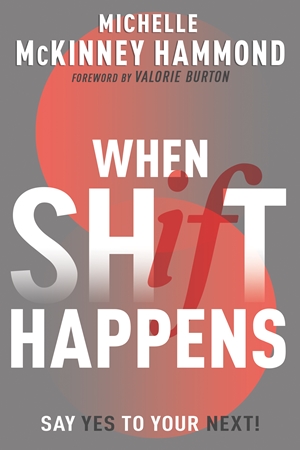
by Allen Reynolds, UrbanFaith Editor | Apr 8, 2024 | Commentary, Faith & Work, Headline News, Relationships |
Dr. Michelle McKinney Hammond is one of the most successful authors in the country. She is the new host of UMI’s Sunday School Made Simple. She is an award winning artist, producer, entrepreneur, host, former advertising executive, internationally sought out speaker, and faith leader. But she has had her life shaped by profound changes and difficulties. In her latest book When Shift Happens, she gets real about her struggles, her faith, and the lessons she has learned about embracing change through our seasons of life. Full interview is above. More about the book and author is below.
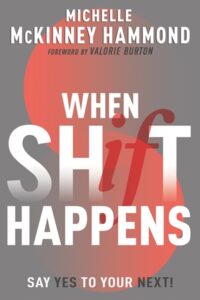
In When Shift Happens: Say Yes to Your Next (available September 12 from Whitaker House), Michelle examines the difference between those who flounder and those who flourish in the seasonal transitions of life. She details the ways that understanding and addressing the season you are in–and assessing its purpose–allows people to not only survive their shift, but to thrive.
Michelle brilliantly bridges the gap between modern society and ancient biblical times, showing that God has been helping people endure “shifts” for centuries. She doesn’t shy away from sharing her own challenging situations, recounting her experiences with the pandemic, a car accident, and other personal traumas, along with how she found the strength through God’s teachings to say “yes” to these challenges as they arose.
“Mindset is everything when confronted with unanticipated change,” Michelle writes in When Shift Happens. “You are never out of options unless you choose to be. Emerging cycles all point to one thing—whether you are ready or not, shift happens. It’s not the end. There’s always a next!”
MORE ON THE AUTHOR: Many discovered the explosive talent of Michelle McKinney Hammond with her first bestseller, What to Do Until Love Finds You: Getting Ready for Mr. Right, in 1997. Since that time, Michelle has enjoyed a multifaceted career as an author, speaker, singer, producer, actress, relationship expert, and life coach, reaching men and women from all walks of life.
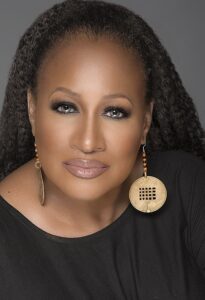
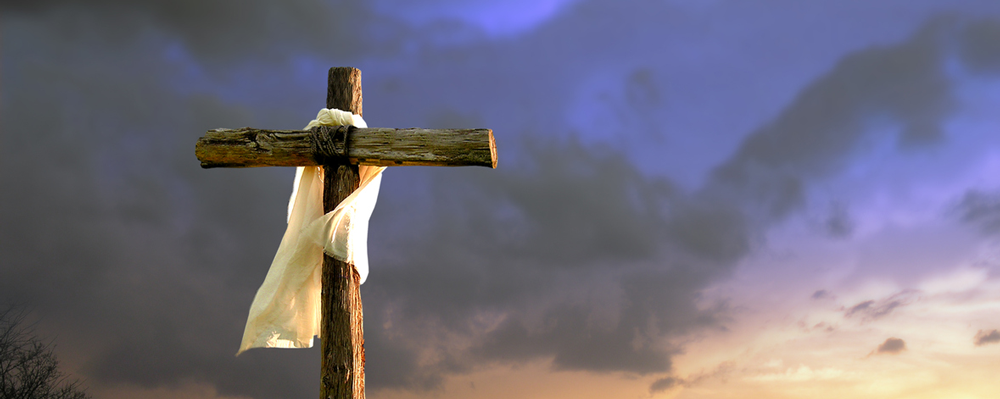
by Allen Reynolds, UrbanFaith Editor | Mar 30, 2024 | Commentary, Headline News |
Is it time for Easter again? It doesn’t feel like Easter season. Easter (or Resurrection Sunday for the purists) is around the corner, and yet many Millennials feel little reason to celebrate. When I think of Easter, I think of special sermons, church presentations, fancy outfits, and big dinners. I also think of bunnies, eggs, and baskets thanks to corporate marketing. Ironically, what I don’t think about immediately is the Resurrection. But isn’t that the reason for the season?
Selective Memory
 For the past few years, social media campaigns have tried to remind people that Christmas is about Jesus’ birth. It has become so commercialized that people come out of the woodwork you didn’t even know were Christian. They remind everyone following them that Jesus is the reason for the season, that Jesus is the best gift we could get in the season, that Jesus wants us to give in this season, and that we should be content whether we get other gifts or not.
For the past few years, social media campaigns have tried to remind people that Christmas is about Jesus’ birth. It has become so commercialized that people come out of the woodwork you didn’t even know were Christian. They remind everyone following them that Jesus is the reason for the season, that Jesus is the best gift we could get in the season, that Jesus wants us to give in this season, and that we should be content whether we get other gifts or not.
But Easter doesn’t have gift-giving traditions. Were it not for multi-colored chocolate eggs, most of us would not even think about what we receive on that holiday. But Easter is supposed to be the center of the Christian faith. Jesus goes to the Cross, dies for our sins, and resurrects with power, giving hope of salvation to all the earth.
Perhaps one of the reasons why Easter doesn’t immediately remind us of resurrection is because resurrection hope seems so far removed from our current situation. Current events in our world—from politics to protests, global warming to global injustice, doubt in our lives and doubt in our faith—have caused many to lose hope.
The Sweet By-and-By
It is hard to think about the hope of resurrection when we are surrounded by so much death. But that is exactly why we as Christians need to remember the Resurrection. What greater hope is there in the midst of a death culture than the revelation that death is not the end of the story? That our God loved us enough to take death on Himself and then overcame death itself?
Resurrection is not just about “the sweet-by and-by” either. We have to hold on to the promise of life after this life, but resurrection also comes when we hear the testimonies of those who are still living, still striving, still fighting, still hopeful despite facing ridiculous obstacles and even threats to their very lives.
Jesus gives new hope to a woman with an issue of blood who was treated as dead by society, and He not only wasn’t afraid of a man with a legion of demons, He set the man free and made him a missionary. Jesus is hope for resurrection in a world that needs new life.
Time to Remember
It could be because of Saint Patrick’s Day that takes place around the same time, so people are focused on Irish beer and clovers. It could be because we feel like we’ve heard the Easter sermon before, so we’ll catch it on livestream. It could be that you didn’t know Mardi Gras, Carnival, and Lent had anything to do with Easter, so it just isn’t in your mind.
It could be because no one you know buys Easter clothes, or because there will be no big dinner, or because you’ve got so many other things going on that you just forgot. But whatever the reason we weren’t thinking about the Resurrection yet for Easter, we should take time to remember it now.
It is the story of our salvation. It is the “right now” power of God. It is what we need to face today together.






 Maina
Maina Maina
Maina









 For the past few years, social media campaigns have tried to remind people that Christmas is about Jesus’ birth. It has become so commercialized that people come out of the woodwork you didn’t even know were Christian. They remind everyone following them that Jesus is the reason for the season, that Jesus is the best gift we could get in the season, that Jesus wants us to give in this season, and that we should be content whether we get other gifts or not.
For the past few years, social media campaigns have tried to remind people that Christmas is about Jesus’ birth. It has become so commercialized that people come out of the woodwork you didn’t even know were Christian. They remind everyone following them that Jesus is the reason for the season, that Jesus is the best gift we could get in the season, that Jesus wants us to give in this season, and that we should be content whether we get other gifts or not.